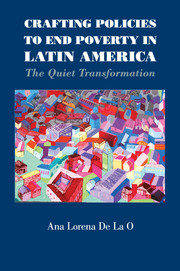Book contents
- Frontmatter
- Dedication
- Contents
- List of Figures
- List of Tables
- Acknowledgments
- 1 Introduction
- 2 The Universe of Cash Transfer Programs
- 3 Politics of Fighting Poverty
- 4 Explaining Policy Adoption and Design
- 5 Explaining Policy Outcomes
- 6 Conditional Cash Transfers and Clientelism
- 7 The Electoral Bonus of Conditional Cash Transfers
- 8 Conclusions
- Appendix
- References
- Index
6 - Conditional Cash Transfers and Clientelism
Published online by Cambridge University Press: 05 March 2015
- Frontmatter
- Dedication
- Contents
- List of Figures
- List of Tables
- Acknowledgments
- 1 Introduction
- 2 The Universe of Cash Transfer Programs
- 3 Politics of Fighting Poverty
- 4 Explaining Policy Adoption and Design
- 5 Explaining Policy Outcomes
- 6 Conditional Cash Transfers and Clientelism
- 7 The Electoral Bonus of Conditional Cash Transfers
- 8 Conclusions
- Appendix
- References
- Index
Summary
There are two countervailing accounts in the literature about the relationship between social policy and clientelism. On the one hand, Scott describes how important welfare benefits were to the demise of clientelism in the United States (1969). In his account, the institutionalization of welfare replaced patrons' favors.
The services that tied the client to the machine were either no longer necessary or were performed by other agencies than the machine … With aid to dependent children and old age assistance becoming the formal responsibility of government agencies ‘the precinct captain's hod of coal was a joke’. The protective and defensive function of the machine had simply ceased to be important political incentives (1156).
Along these lines, Weyland (1996) noted in the context of the return of democracy in Brazil that: “Only benefits guaranteed by the state through redistributive measures can break the hold of clientelist patrons and set the poor free to effectively exercise their citizen rights” (6).
On the other hand, Kitschelt argues that “some institutional designs to deliver social policy benefits facilitate the growth of clientelistic linkage practices between politicians and electoral constituencies and in some instances may well have been designed to deliver such consequences” (2007, 298). He observes that in both young and established democracies, social policy benefits such as public housing, and to a lesser extent social insurance benefits for unemployment, old age, and illness that are targeted directly at mass electoral constituencies are a core component of clientelistic practices (Kitschelt 2007).
Both accounts are useful for understanding the dynamics of conditional cash transfer programs in Latin America. In some countries in the region, the president exerts far greater power than other branches of government and can unilaterally design conditional cash transfer policies. Where this is the case, I argue that policies are more likely to serve the political interests of the president's party than the poor.
- Type
- Chapter
- Information
- Crafting Policies to End Poverty in Latin AmericaThe Quiet Transformation, pp. 112 - 133Publisher: Cambridge University PressPrint publication year: 2015



